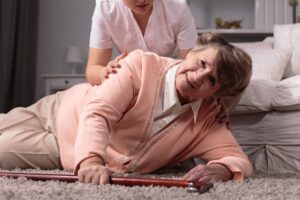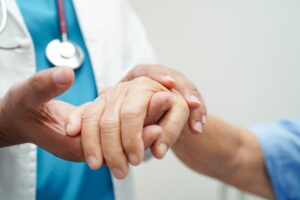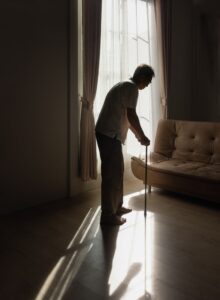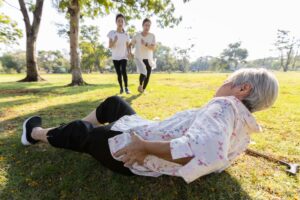What to Do if Your Parent Falls in a Nursing Home?
Abuse and NeglectFalls can happen to anyone, but the situation can become more serious and complex when they occur in a nursing home. Suppose your parent has experienced a fall in a nursing home. In that case, taking immediate action is essential to ensure their safety and well-being. Below, we’ll discuss what you can do if your parent falls in a nursing home and why it’s beneficial to seek the guidance of a nursing home injury attorney.
If your parent has suffered an injury due to a fall in a nursing home, remember that you are not alone. The law is on your side, and there are legal professionals ready to help you navigate this difficult situation. An experienced Charleston nursing home injury attorney can help you understand your rights and take steps to protect your loved one.
The Impact of Falls in Nursing Homes

Falls in nursing homes can have devastating impacts on elderly residents. According to the Centers for Disease Control and Prevention (CDC), falls are the leading cause of injury-related fatalities among adults aged 65 and older. Such falls can result in fractures, head injuries, and other serious medical complications, some of which can be fatal.
Nursing homes have a legal and ethical duty of care to ensure the safety of their residents. If your parent falls in a nursing home, it may be an indication of negligence or inadequate supervision. This is where the representation of a nursing home injury attorney can be invaluable.
Immediate Steps to Take

When you receive news that your parent has fallen in a nursing home, it’s natural to feel panicked, scared, and overwhelmed. However, try to stay calm and take immediate action. Here are some steps you can take:
- Ensure your parent’s immediate safety: If your parent has fallen, make sure they receive immediate medical attention. Contact the nursing home staff and ask them to call for medical assistance if necessary.
- Document the incident: Take photos of the area where the fall occurred, including any hazards or unsafe conditions. Speak with witnesses who may have observed the fall and ask them to provide a written statement. Take pictures of any apparent injuries, broken furniture, or ripped clothing.
- Report the incident: Notify the nursing home management about the fall and request a written incident report. Such documentation will be crucial if you decide to pursue legal action.
- Seek medical evaluation and treatment: Even if your parent appears to be uninjured, have them evaluated by a healthcare professional. Some injuries, such as internal bleeding, may not be immediately apparent. Follow through with any recommended treatment or therapy to ensure your parent’s well-being. Depending on your relative’s condition, they may be unable to appropriately verbalize pain or other symptoms, which is another reason why a thorough medical evaluation is necessary.
- Gather relevant documents: Collect medical records, incident reports, and other documentation related to your parent’s fall. This information will be vital when consulting with a nursing home injury attorney.
- Meet with a nursing home injury attorney: You will want to meet with an attorney as soon as possible, as they can help you protect your rights and begin collecting evidence. Most work on contingency fees, which means you won’t owe them anything unless or until they obtain compensation on your behalf.
Understanding Liability in Nursing Home Falls
Determining liability in nursing home falls can be complex. Several parties, including the nursing home staff, administrators, and even equipment manufacturers, may share responsibility. To establish liability, you must prove that negligence or lack of proper care contributed to the fall. Here are some factors that can impact liability:
- Poor staff training: If nursing home staff members are not adequately trained in fall prevention and safety protocols, the facility can be held liable for negligence.
- Inadequate supervision: If your parent fell due to a lack of supervision or attention from the nursing home staff, the facility may be liable for their injuries.
- Environmental hazards: Nursing homes are responsible for maintaining a safe environment for their residents. The nursing home may be held responsible if the fall occurred due to unsafe conditions, such as wet floors, poor lighting, or faulty equipment.
- Negligence in care: If your parent’s fall was a result of inadequate care, such as failure to assist with mobility or administer medication properly, the nursing home may be considered negligent.
Causes of Nursing Home Falls

Nursing home falls can result from a combination of factors, often stemming from the complex and multifaceted nature of caring for elderly individuals. Several factors contribute to nursing home falls:
Environmental Hazards
- Poor Lighting: Inadequate lighting in common areas, hallways, or resident rooms can increase the risk of falls. Dimly lit spaces may make it challenging for residents to navigate safely.
- Slippery Floors: Spills, recently cleaned floors, or the use of inappropriate cleaning solutions can create slippery surfaces. Residents may lose their footing, leading to falls.
- Lack of Handrails: The absence or inadequate installation of handrails in hallways and bathrooms can contribute to falls, especially when residents need support for stability.
- Clutter and Obstacles: Cluttered and poorly organized spaces with obstacles like cords, furniture, or medical equipment can impede residents’ movement and increase the likelihood of tripping or falling.
Staffing Issues
- Understaffing: Nursing homes facing staffing shortages may struggle to provide timely assistance to residents. Understaffing contributes to delayed response times, hindering the ability to assist those at risk of falling.
- Inadequate Training: Insufficient training for staff in proper fall prevention techniques and resident assistance can lead to mistakes or oversight, increasing the risk of accidents.
Medical Conditions and Medications
- Muscle Weakness and Balance Issues: Conditions like arthritis or neurological disorders can contribute to muscle weakness and impaired balance, making residents more susceptible to falls.
- Side Effects of Medications: Some medications may cause dizziness, lightheadedness, or other side effects that compromise a resident’s stability, increasing the likelihood of falls.
Even still, nursing home staff should be aware of these elements and prepared to mitigate the risk of residents falling. A resident who is dizzy from a medication or has poor balance can’t be blamed for their own fall when the nursing home staff knew about their condition.
Cognitive Impairment
- Dementia and Alzheimer’s Disease: Residents with cognitive impairments may experience disorientation or confusion, leading to an increased risk of falls. Memory loss can affect their ability to recognize and avoid hazards.
- Wandering Behavior: Residents exhibiting wandering behavior may unintentionally place themselves in unsafe areas or situations, heightening the risk of falls.
Inadequate Fall Risk Assessment
- Lack of Individualized Care Plans: Failure to conduct thorough fall risk assessments for each resident and develop personalized care plans can result in inadequate preventive measures tailored to their needs.
- Failure to Communicate Risk: Ineffective communication among staff members regarding residents’ fall risks can lead to lapses in supervision and appropriate interventions.
Footwear and Personal Factors
- Improper Footwear: Residents wearing ill-fitting or unsuitable footwear may experience difficulties maintaining proper footing, increasing their fall vulnerability.
- Vision Impairment: Poor eyesight or untreated vision problems can contribute to misjudging distances, obstacles, or elevation changes, elevating the risk of falls.
Poor Supervision
- Insufficient Monitoring: Lack of continuous monitoring, especially during high-risk activities such as transferring from bed to chair or walking, can result in falls.
- Inadequate Supervision in High-Risk Areas: Areas with a higher risk of falls, such as bathrooms, may require additional supervision to ensure residents’ safety.
Addressing nursing home falls requires a comprehensive approach, including regular risk assessments, staff training, environmental modifications, and tailored care plans for each resident. When nursing homes fail to address these contributing factors, the incidence of falls will increase among their residents, and they can be held liable for the resulting injuries and damages.
Common Injuries in Nursing Home Falls
Nursing home falls can result in a range of injuries, which are often more severe in elderly individuals due to their frailty and vulnerability. Understanding these common injuries is crucial for residents, their families, and caregivers to prioritize preventive measures and provide appropriate care. Here are some common injuries associated with nursing home falls:
Fractures

- Hip Fractures: Among the most prevalent injuries, hip fractures are particularly common in elderly individuals. Falls can cause the hip bone to break, leading to significant pain, mobility issues, and even death.
- Wrist and Arm Fractures: Residents may instinctively reach out to break their fall, resulting in fractures in the wrist, arm, or hand. Fractures in these areas can affect daily activities and independence.
Head Injuries
- Traumatic Brain Injuries (TBIs): Falls often lead to head injuries, including TBIs. The impact of the fall can cause concussions or more severe brain injuries, affecting cognitive function, memory, and overall well-being.
- Skull Fractures: Severe falls can result in fractures to the skull, posing a serious risk to the resident’s health. Immediate medical attention is crucial for these severe injuries.
Soft Tissue Injuries
- Contusions and Bruises: Residents may suffer from contusions and bruises, especially in areas like the hips and knees. While these injuries may seem minor, they can contribute to discomfort and affect mobility.
- Sprains and Strains: Falls can cause ligaments and muscles to stretch or tear, resulting in sprains and strains. These injuries can be very painful and require proper care and rehabilitation.
Back Injuries
- Vertebral Fractures: Falls may lead to fractures in the spine’s vertebrae. These fractures can be particularly problematic for elderly individuals and may contribute to chronic back pain.
- Herniated Discs: The impact of a fall can cause the discs between the vertebrae to rupture or herniate. This can result in nerve compression, leading to pain, numbness, or tingling.
Emotional and Psychological Impact
- Fear of Falling: Nursing home falls can have emotional consequences beyond physical injuries. Residents may develop a fear of falling, impacting their confidence and willingness to engage in daily activities.
- Depression and Anxiety: Chronic pain and the fear of subsequent falls can contribute to the development of depression and anxiety in nursing home residents. Emotional well-being is a crucial aspect of overall health.
Internal Injuries
- Internal Bleeding: Severe falls can result in internal injuries, including internal bleeding. These injuries may not be immediately apparent, underscoring the importance of thorough medical assessments following a fall.
- Organ Damage: Falls can lead to trauma to internal organs, particularly in the abdominal area. Prompt medical attention is essential to diagnose and address organ damage.
Pressure Ulcers (Bedsores)
- Extended Immobility: While falls don’t directly produce bedsores, falls may result in extended periods of immobility during recovery, increasing the risk of pressure ulcers. Residents who spend prolonged periods in bed or a wheelchair may develop painful and potentially serious bedsores.
Preventing nursing home falls requires a comprehensive approach, including environmental modifications, staff training, and personalized care plans. Regular assessments, proactive measures, and open communication between residents, families, and caregivers are essential to minimize the risk of falls and their associated injuries in nursing home settings.
The Benefits of Hiring a Nursing Home Injury Attorney
Navigating the legal system can be overwhelming, especially when dealing with the emotional stress of your parent’s fall. Hiring a nursing home injury attorney can provide several benefits, including:
- Skills and experience: Nursing home injury attorneys specialize in cases involving nursing home negligence and abuse. They have the knowledge and experience to navigate the complexities of these cases and fight for your rights.
- Investigation and gathering evidence: Attorneys have the resources and experience to thoroughly investigate the circumstances surrounding your parent’s fall. They can gather evidence, interview witnesses, and consult with medical experts to build a strong case on your behalf.
- Negotiating with insurance companies: Attorneys are skilled negotiators who can handle communication and negotiations with insurance companies on your behalf. They will work to ensure that you receive fair compensation for your parent’s injuries and any related expenses.
- Filing a lawsuit if necessary: If a fair settlement cannot be reached, your attorney can file a lawsuit and represent you in court. They will guide you through the legal process and fight for your rights at every step.
Remember, you don’t have to face this difficult situation alone. Suppose your parent has fallen in a nursing home. In that case, take immediate action to ensure their safety and well-being and to have a skilled attorney. A personal injury lawyer can help you navigate the complex legal process and hold the responsible parties accountable. Contact one today to get your claim started.

Nathan Hughey, an attorney and fourth-generation South Carolinian, founded Hughey Law Firm in 2007. Before that, he spent five years defending nursing homes and insurance companies. Leveraging his experience, he now advocates for those injured or wronged by such entities, securing over $220 million in verdicts and settlements.